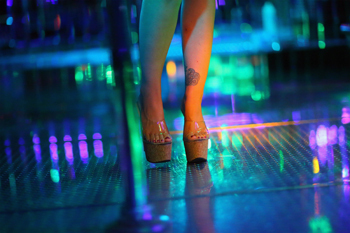Most people would like to believe they have a basic grasp on why they feel what they feel. As always, we’re here to inform you that what you believe is wrong. Your emotions are dictated by the outside world in ways you might find bizarre and shocking. For example …
5. Making a Person Feel “Bigger” Turns Them into a Reckless Asshole
 Brand X Pictures/Stockbyte/Getty
Brand X Pictures/Stockbyte/Getty
Most of us can spot brash, confident people on sight. They stand tall, make big hand gestures, and fill as much space as possible. Everything about their posture, body language, and mannerisms say “I am the goddamned center of the universe! Everyone stop and notice me!” Likewise, you can spot nervous, timid people by how much they try to scrunch away and avoid notice. You find them slouched over, looking down, trying to find a corner to hide in. Well, believe it or not, you can actually change a person’s attitude toward the world by forcing their body language in one direction or the other.
 Stockbyte/Stockbyte/Getty Images
Stockbyte/Stockbyte/Getty Images
“Don’t think of it as a back brace; it’s a confidence booster!”
Researchers conducted an experiment published in the journal Psychological Science in which they had a group of subjects perform some stretching exercises (under the pretense that they were really studying the effects of stretching) and then randomly selected them to adopt either wide or contracted postures.
Prior to the commencement of the exercise, the participants were told they would be paid $4, but after the stretching exercises, the researchers deliberately overpaid them $8 in a way that looked like a mistake (by throwing in a $5 bill). Seventy-eight percent of the people who were put in the big, expanded, confident body positions kept the money . Only 38 percent of the other group did.
. Only 38 percent of the other group did.
 Wavebreakmedia Ltd/Wavebreak Media/Getty
Wavebreakmedia Ltd/Wavebreak Media/Getty
“You certainly seem like a bold, confident young woman. Get lost, we don’t hire thieving bastards here.”
This effect might also explain another phenomenon close to our hearts — why people who drive SUVs are such insufferable, reckless douches on the road. In another experiment, researchers recruited 71 subjects and sat them in realistic driving simulators, some with large seats like in an SUV or truck, and some with cramped seats like in a VW Beetle. Sure enough, the drivers in the large seats tended to drive more recklessly and were more likely to commit hit-and-runs rather than stop according to the rules.
are such insufferable, reckless douches on the road. In another experiment, researchers recruited 71 subjects and sat them in realistic driving simulators, some with large seats like in an SUV or truck, and some with cramped seats like in a VW Beetle. Sure enough, the drivers in the large seats tended to drive more recklessly and were more likely to commit hit-and-runs rather than stop according to the rules.
Now, you might figure that people in the “bigger” pretend car subconsciously felt like they were safer in the event of an accident . Maybe it’s not about feeling like a big, dominant douchebag, but just being less worried about a collision flattening their smart car like a beer can.
. Maybe it’s not about feeling like a big, dominant douchebag, but just being less worried about a collision flattening their smart car like a beer can.
 Jeff J Mitchell/Getty Images News/Getty Images
Jeff J Mitchell/Getty Images News/Getty Images
“You know, if these small cars are so damn unsafe, maybe they should outlaw them.”
are so damn unsafe, maybe they should outlaw them.”
Well, the researchers then monitored real-world cases of illegal double parking in New York City on weekdays between 12 p.m. and 7 p.m. They found that driving a big car increased the probability of double parking from 51 percent to a whopping 71 percent. Even when the researchers took into account the fact that drivers of larger cars might have more difficulty finding parking spots, they still found a strong relationship between the size of the car and the possibility of vehicular douchebaggery. The unspoken thought process seems to come down to “Of course I’m the most important person in the world! I’m huge!”
 Michael Blann/Digital Vision/Getty Images
Michael Blann/Digital Vision/Getty Images
Everyone likes a sunny day, unless you’re like a vampire or a mushroom or something, but sunshine actually plays a far greater role in the day-to-day running of society than you probably think. Have you ever made an incredibly unwise purchase, like a pair of underwear with a USB port, and wondered how you got talked into such a thing? It probably happened on a sunny day.
with a USB port, and wondered how you got talked into such a thing? It probably happened on a sunny day.
 Fuse/Fuse/Getty Images
Fuse/Fuse/Getty Images
This is why San Diego has the highest number of Ernest LaserDisc box sets per capita in the country.
sets per capita in the country.
Studies found that pleasant weather can impair your judgment and make you temporarily dumber and more easily misled. In one study, 122 undergraduates were approached on either sunny or cloudy days and asked to complete a survey about a pressing topic. On sunny days, the students were more persuaded by weak arguments, as though pleasant weather makes us feel more positive about everything, including obvious bullshit. You get the same results when trying to convince somebody to go out with you — in another experiment, they had random attractive guys approach over 500 women on cloudy and sunny days and invite them out for drinks. Sure enough, the women were more receptive on sunny days than cloudy ones.
on cloudy and sunny days and invite them out for drinks. Sure enough, the women were more receptive on sunny days than cloudy ones.
And it only gets weirder from there. Do you wait tables for a living, but your grotesque appearance and questionable hygiene means that you don’t get tipped as often as you’d like? Try drawing a picture of the sun on the bottom of the customer’s bill. That’s right: Just seeing a drawing of the sun ends up making people tip more, regardless of whether the sun is actually shining outside. Wait! There’s more! Researchers have also noticed that trading on the New York Stock Exchange is especially active on sunny days. And it’s not just Wall Street — they tracked 26 of the major stock exchanges around the world over the course of 15 freaking years and found the same effect. Even these jaded veteran traders were more willing to take risks because, hey, it’s a beautiful day! Nothing can go wrong on such a lovely day! Nothing!
over the course of 15 freaking years and found the same effect. Even these jaded veteran traders were more willing to take risks because, hey, it’s a beautiful day! Nothing can go wrong on such a lovely day! Nothing!
 Jupiterimages/BananaStock/Getty Images
Jupiterimages/BananaStock/Getty Images
“Apple stock for Dogecoins … Eh, why not!”
 Thinkstock/Stockbyte/Getty Images
Thinkstock/Stockbyte/Getty Images
Ever wonder why people who are obsessed with money are often miserable? Sure, there are exceptions, but often it seems like most people for whom money is an important
part of their lives tend to turn into wolves of Wall Street. Well, experiments show that, for whatever reason, just thinking about money makes people unhappy (and occasionally slightly evil). And we don’t mean that spending a day contemplating your overdue bills ruins your mood — that would be obvious. Experiments show that even momentary, subconscious reminders that money is a thing is enough to darken the spirits of most people.
 Digital Vision./Photodisc/Getty“I won the lottery? Ugh. Just … fine. Give it here.”
Digital Vision./Photodisc/Getty“I won the lottery? Ugh. Just … fine. Give it here.”
In one study, they had a group of participants fill out a short questionnaire, after which they were rewarded with a bar of chocolate (scientists kind of assume that everyone has the mind of a toddler). For half of the participants, the questionnaire came with a photograph of some money . That’s all; just a photo. Despite the fact that it wasn’t real money and nobody was even told they’d be getting real money, the folks who glimpsed the photo reported less enjoyment from eating the chocolate than those who hadn’t. The simple pleasure was downgraded with nothing more than a reminder that money exists.
In another experiment, researchers split 50 test subjects into two random groups. The first group was exposed to a variety of money -related cues and phrases, as well as a bunch of neutral ones, while the second group was exposed exclusively to neutral cues. Both sets of participants were asked to assess how likely they were to commit a variety of morally questionable acts (for example, pilfering office supplies). Those who had been exposed to the money cues — who had merely seen some words and pictures related to money — were more willing to engage in dodgy behavior. This might be the reason you see so much questionable behavior in strip clubs (although there might be others).
 Joe Raedle/Getty Images News/Getty Images“Pour Some Sugar on Me” is the pervert’s Pavlovian bell.
Joe Raedle/Getty Images News/Getty Images“Pour Some Sugar on Me” is the pervert’s Pavlovian bell.
Anyway, the theory is that the thought of money elicits in us a physiological condition researchers refer to as a “business decision frame.” Whenever the topic of money comes up, our brains go into selfish mode, resulting in a heightening of the “fuck everyone but me” instinct.
 Peter Zvonar/iStock/Getty Images
Peter Zvonar/iStock/Getty Images
So you’ve finally decided to get around to writing that novel you’ve been developing in your head for the past few years. You know, the one where the residents of an orbiting sex colony find a way to clone dinosaurs with cyborg parts (Working title: Cybersaurus and the Space Hookers). What would be the ideal place to bang out your masterpiece? An idyllic, homely cottage in the woods? Or your dingy, waterlogged basement?
 Jupiterimages/Stockbyte/Getty ImagesYou know, if the very public, self-aggrandizing coffee shop isn’t an option.
Jupiterimages/Stockbyte/Getty ImagesYou know, if the very public, self-aggrandizing coffee shop isn’t an option.
It turns out that “going back to nature ” might have more of a benefit to creativity than just the peace and quiet and singing animals. We’ve already looked into the bizarre ways that colors control your mind, specifically the colors red and blue, which affect everything from how well you do on a test to how fast you heal. Well, as it turns out, there are other colors on the spectrum that do freaky things to your brain: Being exposed to green can apparently make you more creative.
Researchers gave subjects a number of creative tests after exposing them to the color green for as little as two seconds, while another group was exposed to colors such as white, gray, red, and blue. In one experiment, participants were asked to come up with as many esoteric uses they could for a tin can within two minutes; another experiment asked participants to develop as many different shapes as they could from a given geometric shape. Although the participants weren’t made aware of the intentions of the researchers, in all cases, those who had been exposed to the color green prior to the study came up tops.
 Fuse/Fuse/Getty ImagesIt’s no coincidence that St. Patrick’s Day always produces that unique kind of drunkenness.
Fuse/Fuse/Getty ImagesIt’s no coincidence that St. Patrick’s Day always produces that unique kind of drunkenness.
Scientists have uncreatively decided to call this “the green effect” (maybe if they planted a few more trees around the place they would have been able to come up with something better), and it appears to be due to the fact that green is the color of nature and our brains have evolved to loosen up at the calming sight of trees and grass. Unless the green comes in the form of dollar bills, as we mentioned before. Hey, mind control is a complicated business.
 BananaStock/BananaStock/Getty Images
BananaStock/BananaStock/Getty Images
And now we arrive at one so bizarre that science doesn’t even have a logical guess as to why it occurs. In multiple experiments, people report feeling happier when thinking about words that are typed on the right side of the keyboard. And no, it has nothing to do with the subjects being right-handed — it works either way.
 Image Source/Digital Vision/Getty ImagesMaybe this is why people are so miserable to stewardesses.
Image Source/Digital Vision/Getty ImagesMaybe this is why people are so miserable to stewardesses.
In the experiment, researchers had subjects look at a list of words and asked them to rate how positively or negatively they felt about them. Just to be thorough, the researchers created similar lists in Spanish and Dutch. Across all three languages, the test subjects rated words you’d type on the right-hand side of the keyboard more positively than those you’d type on the left-hand side. The effect was so pronounced that with each extra letter that appeared on the right-hand side of the QWERTY keyboard, feelings of positivity increased by 4 percent. This is despite the fact that you can type delightfully whimsical phrases such as “fart cart” without using your right hand at all.
What the shit is going on here? Well, the researchers don’t really know. As we mentioned, the obvious answer would have been that most people are right-handed and thus prefer the words that are easier to type with their dominant hand. But no, they got the same results with left-handed subjects. Another theory was that the inventor of the QWERTY keyboard spoke English and subconsciously put all of the positive letters to the right, but the same effect was seen with Spanish and Dutch words.
 Jupiterimages/Stockbyte/Getty ImagesWay to fuck up a good thing, other languages.
Jupiterimages/Stockbyte/Getty ImagesWay to fuck up a good thing, other languages.
And it gets even more bizarre than that. The QWERTY effect, as the researchers are choosing to call it, was tested to its extreme when the researchers made up over 1,600 meaningless words and then asked 800 test subjects to rate them. Even then, words on the right-hand side were rated more positively than those on the left, even though the test subjects had never seen those words or typed them in their entire lives.
Source: www.cracked.com







